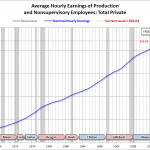The 20th century was a bull market for literacy, freedom, prosperity, health, and technology.
As a result of these gains, wealth has increased exponentially, and world poverty is now at all-time lows. Life expectancy continues to improve in most countries, global literacy is near 90%, and there are well over 100 democracies throughout the planet.
But not every positive trend can keep going forever. Sometimes things regress temporarily, only to be corrected later on. Other times things change more fundamentally – and that regression can be the beginning of a newer, long-term reality.
THE DECLINE OF FREEDOM: AN 11-YEAR TREND
According to the Freedom in the World 2017 Report, which scores countries annually on various levels of freedom, there have been recent setbacks in political rights and civil liberties in a number of “Free” countries. These newest declines are partially the result of populist and nationalist forces making significant gains in democratic states.
But Freedom House, the international watchdog organization that produces the annual report, says that this is not an isolated occurrence. In fact, based on their data and methodology, freedom has actually declined on a global basis for the last 11 years.
Here are the aggregate gains and declines in freedom for each year – you can see that declines have been outweighing gains since 2006.
11 YEARS OF DECLINE

While the trend is clear, the most worrying part is that the biggest aggregate declines happened in the two most recent years. Is that a coincidence, or is the decline of freedom accelerating?
Here are the specific countries that have had the biggest declines in freedom over the last decade:
LARGEST AGGREGATE DECLINES OVER THE LAST DECADE

Countries like Yemen and Ethiopia, which are classified as “Not Free”, have lost further freedom. However, “Free” countries like Hungary or Nauru also lost 10 or more points in the index.












Leave A Comment